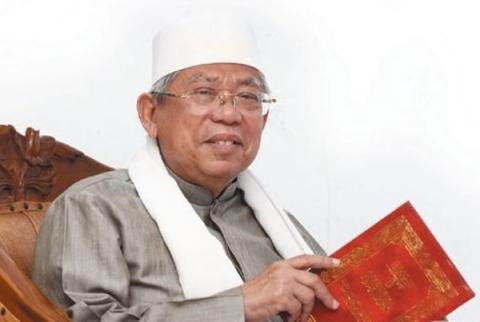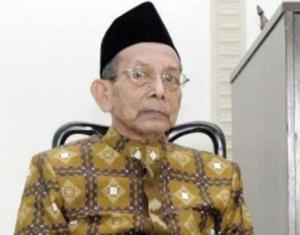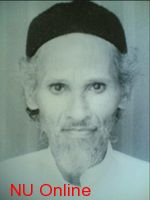His proposal to change hajj time accepted by Saudi Arabia
NU Online · Jumat, 12 Juni 2009 | 10:11 WIB
In every time ahead of the coming of the fasting "Ramadhan" month, Idul Fitri and Idul Adha, Muslims especially in the country have most of the time been in dissention oipinion in determining the fall of their date. Nevertheless there have no been many ulema (crerics) devoting themselves in the field of Islamic astrology (ilmul falak). One of the noted senior ulema is KH Nur Ahmad from Jepara, Central Java. When KH Abdurrahman Wahid (Gus Dur) served as general chairman of the Central Board of Nahdlatul Ulama (PBNU), KH Nur Ahmad was the man representing Central Java and involved in the Lajnah Falakiyah (Committee of Astrology) of PBNU.
Nur Ahmad was born in Robayan, Jepara in 1930 and started his study in his own hometown before continuing his study at the Taswiquth Thullab Islamic Junior High School (MTs) in Kudus. As long as studying at the MTs he was not recognized as a brilliant and outstanding student. But in this educational institution Nur Ahmad started to introduce the subject of astrology and was personally under the supervision of a prominent ulema KH Turaichan (Kudus) by using what locally called as rubu' (such a quarter-circle tool for measuring) and the method of logarithm. Nur Ahmad whose a great interest in math was personally taught by KH Turaichan in dealing with a<>strology.
Referring to his story, Nur Ahmad seriously studied astrology as he wassitting at the MTs. MTs in the time was considered as the highest educational level because there was no such Islamic senior high schools. In the meantime, in Jepara, there were no junior high schools. Nur Ahmad had interest to format watch. Because the watch was often formatted, it was broken.
While studying at the Kudus MTs, Nur Ahmad focused on the falak subject by using an astrological book written by Kiai Mawardi of Solo. Nur Ahmad copied the book with a pen (usually used by santri in pesantren), namely a pointer writing tool made of such splintered rib by using stained-ink. This tool has such benefits as more durable and unfaded. Though there have now been bolpoints, many santri have till now remained using the rubu' as their writing tool.
Because of his curiousity in the falak subject, Nur Ahmad did feel satisfied to study just from a teacher. At this point, he personally studied to several senior ulema in Kudus like Kiai Rifa'i (Kudus). While Nur Ahmad's special way of study to KH Turaichan was the teaching method used by KH Turaichan was not by using any book. Once he studied, he should understand.
Nur Ahmad had regular times with KH Turaichan. In one day when Nur Ahmad could not attend his scheduled time of study with KH Turaichan for approximately a month, Nur Ahmad had no the courage to come to meet KH Turaichin since he did understand next materials. When he came to KH Turaichan, asking "What is wrong with you Nur?", Nur just answered, "I have understood teacher". KH Turaichan later went on his next teachings.
Following his study in Kudus, Nur Ahmad later went to some pesantren in such regions in as Tebuireng (Jombang), Salatiga, Rembang, Lasem, and Langitan (Tuban).
Nur Ahmad later continued his journey to study astrology following the permission given by his beloved teacher KH Turaichan because Nur Ahmad was considered to have mastered the basics of astrology and in need of meeting with other ulema to deepen the subjectmatter. From this, Nur Ahmad mastered many astrological methods and studied many astrological books such as Hikmatul Wasa'id and Kurotul Wafiyah.
While, during his study in Salatiga (Central Java), Nur Ahmad studied to Kiai Zubair, the author of a book entitled "Khulasotul Wafiyah" and in Pesantren Langitan Widang Tuban (East Java), Nur Ahmad studied to KH Abdul Hadi and was closed to KH Abdullah Faqih.
Though he met with the prominent ulema, Nur Ahmad admitted that he always arranged his time specially to meet his first teacher, namely KH Turaichan in Kudus so that Nur Ahmad was regarded as one of the most beloved santri studying to the maestro.
In addition to physically studying, Nur Ahmad was also suggested by his teacher KH Turaichan to study spiritually. At this point, he should make devotional visits to the graves of astrology ulema like making a devotional visit to the grave of Raden Dahlan in Semarang, a prominent ulema who is expert in astrology in his time, Kiai Ma'sum Seblak, Jombang and Asy'ari Bawean, Gresik.
"If you want to master astrology, please make a devotional visit to (the grave) of Kiai Ma'sum Jomang. Please send plenty of prayers to clerics (kiai) to get such blessing," he reminded of what which was ever said by KH Turaichan to his student.
Following his long journey of study along with his teacher KH Turaichan, Nur Ahmad has now been considered as one of the most outstainding experts in astrology at PBNU. Initially, KH Turaichan Adjhuri as-Syarofi Kudus serving as chairman of the Calendar Office of Central Java could not fulfill the willingness of PBNU to be member of its Committee of Astrology (Lajnah Falakiyah) appointed Nur Ahmad as his representative to involve himself in the Lajnah Falakiyah. The momentous event took place in 1969 so that thill now KH Nur Ahmad has been the board member of the Lajnah Falakiyah of PBNU.
Changing the Hajj time
one of the reasons on why was Nur Ahmad considered as one of the Muslim experts in astrology that should be taken into account is the fact that he had contribution to change a decision made by Saudi Arabia in determining the time of wukuf in 1988.
In the meantime, the government of Saudi Arabia did want to determine the time of the hajj wukuf based on its own decision in which it determine the time of wukuf felt on Friday to be a momentous great hajj. The government of Saudi Arabia really tried to take efforts in order that the wukuf in the hajj season could be performed on Friday so that it could be regarded as the Great Hajj.
Looking at the fact, PBNU led by KH Abdurrahman Wahid officially mandated KH Nur Ahmad to make correction upon the mistakes done by the government of Saudi Arabia so that Nur Ahmad was, in the time, one of the PBNU board members performing hajj.
In Mecca, Nur Ahmad later made written notes in Arabic that the decision made by the government of Saudi Arabia was wrong. In this case, Nur Ahmad gave reasons written in 18 pages. The notes made by Nur Ahmad was later sent to related parties including the government of Saudi Arabia and the Indonesian embassy in the country.
In his written notes, Nur Ahmad mased his calculation on the difference of the beginning of Dzulqo'dah, namely by completing Syawal to be 30 days. All this was due to the fact that there were only 29 days in previous Ramadhan. Thus, it is impossible that in the hijriyyah (Islamic) calendar, there are three months having 29 days in a row.
In addition, as the PBNU delegate, Nur Ahmad also gathered Indonesians living in Mecca to at least political pressures. Nur Ahmad later suggested them to remain performing wukuf on Saturday if the government of Saudi Arabia still held that the time of wukuf was on Friday. "Please lend me a car and its driver, you come with me and we will still perform wukuf of Saturday," Nur Ahmad told Indonesians living there who are his neighbors from Demak, Lasem and so on.
Finally, the government of Saudi Arabia changed its decision so that the day of wukuf felt on Saturday. To make sure that the government of Saudi Arabia changed its decision, general chairman of PBNU KH Abdurrahman Wahid later came to Saudi Arabia.
"In the time it was commonly regarded that Jepara's Nur Ahmad was the only astrologist in NU. Whereas Nur Ahmad is only the student of KH Turaichan," KH Nur Ahmad said.
Terpopuler
1
Kemenag Tetapkan Gelar Akademik Baru untuk Lulusan Ma’had Aly
2
LKKNU Jakarta Perkuat Kesehatan Mental Keluarga
3
Mahasiswa Gelar Aksi Indonesia Cemas, Menyoal Politisasi Sejarah hingga RUU Perampasan Aset
4
3 Alasan Bulan Kedua Hijriah Dinamakan Safar
5
Anggapan Safar sebagai Bulan Sial Berseberangan dengan Pandangan Ulama
6
Kopri PB PMII Luncurkan Beasiswa Pendidikan Khusus Profesi Advokat untuk 2.000 Kader Perempuan
Terkini
Lihat Semua














